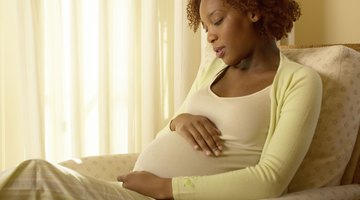7 Causes of Cramping and Lower Back Pain in Early Pregnancy
Pregnancy, even from the very beginning, can cause a lot of new changes in your body. From overnight sore breasts to that sudden craving for food you haven’t touched in years, it can be difficult to know what to expect from your pregnant body.
One symptom that might worry you is cramping and lower back pain in early pregnancy.
While these are common and usually not cause for concern, they can also be signs of a more serious problem. So, how can you tell the difference?
Read on to learn what can cause lower back pain and cramping in early pregnancy, what other symptoms you should look for and when to call your doctor.
Is Cramping and Lower Back Pain Normal in Early Pregnancy?
First of all, you should know that, according to Clara Ward, MD, a Houston, Texas-based maternal-fetal medicine specialist with McGovern Medical School at UTHealth and UT Physicians, most women will experience some kind of lower back pain during pregnancy.
“Under normal circumstances, in order for our body to move, all of the bones and tissues are flexible,” Dr. Ward explains. “During pregnancy, this feature is exaggerated due to physical changes and hormones, which can alter the way ligaments, muscles and bones work together, resulting in pain, and even injury."
She also notes that during pregnancy, the uterus pushes on the abdominal muscles, causing them to separate and weaken. This causes the lower back muscles to pick up the slack, and these muscles are small and tend not to be strong either.
“On top of this, weight gain, the weight and position of the growing baby, and posture changes associated with changes in the center of gravity (due to the growing belly) all contribute to lower back pain,” she says.
Fortunately, Dr. Ward assures us that most of the time, back pain will resolve after pregnancy, unless you have a history of back problems.
But along with the normal physiological changes of pregnancy that can lead to this type of pain and cramping, there are other possible explanations, including the following.
1. Implantation

Is a Backache an Early Sign of Pregnancy?
Learn More
Implantation of a fertilized egg occurs about six to 12 days after conception, according to the American Pregnancy Association.
Implantation is the process of the fertilized egg attaching to the uterine lining. Some women never notice symptoms of implantation, but other women may have abdominal cramping and spotting.
The cramps will be milder than a menstrual period in most cases and do not last very long.
The spotting will also be light and resolve quickly. If a woman does not realize she is pregnant, she may even assume these to be signs of an upcoming period, but usually, implantation happens before your period would be due — so that's one way to tell the difference between implantation bleeding and cramping and menstrual cramps.
Read more: What to Expect with Pregnancy, Week by Week
2. Posture Change
As Dr. Ward mentioned, posture changes can also lead to lower back pain during pregnancy.
As the uterus grows, it places stress and strain on the back. The American Congress of Obstetricians and Gynecologists points out that a woman's center of gravity changes when her stomach gets larger. This change can make her lean backward or adopt other poor postures that cause lower back pain in early pregnancy. The back muscles can also be strained from the weight of the uterus, but this discomfort is more common later in pregnancy.
3. Hormone Changes

A Burning Sensation in the Pelvic Area in Pregnancy
Learn More
Several different hormones increase during pregnancy. Research published in the journal Pain Research and Treatment describes one hormone, called relaxin, that helps make a woman's ligaments relax for delivery. When this hormone starts surging through a woman's body in early pregnancy, she can experience lower back pain from joints in the body becoming overly flexible.
“Progesterone and relaxin cause all of the tissues of the body to relax,” explains Dr. Ward.
“These hormones are responsible for the normal pregnancy-related changes that prepare the cervix to open and allow the birth canal to expand in preparation for delivery. However, the flip side of these essential functions is that they can lead to instability and pain in the joints, leaving you more prone to injury even from relatively normal activities.”
Warnings
If you're experiencing any back pain during pregnancy, take extra caution when exercising or doing physical activity, as all of those hormonal changes could make it easier to injure yourself.
Read more: 5 Ways to Tone Up During Pregnancy and Stay Fit
4. Round Ligament Pain
As the uterus grows to accommodate the fetus and its surrounding fluid, the tissues that connect the uterus to the abdomen and pelvic area can become stretched. This stretching can be painful and is called round ligament pain, according to the American Pregnancy Association.
Women may feel this pain after the first few weeks of pregnancy and more commonly toward the end of the first trimester, or at about 14 weeks. Moving, sneezing and even laughing can make the pain worse. Resting or making slow movements can reduce the discomfort.
5. Constipation and Gas
Sometimes, even something simple like constipation or gas — both of which are more common during pregnancy — can cause cramping during pregnancy. Yvonne Bohn, MD, an OB/GYN at Providence Saint John’s Health Center in Santa Monica, CA, explains that cramping can occur from gas buildup from constipation in the intestines.
“The uterus will sometimes have rapid quick bursts of tightening that can be perceived as a cramp,” Dr. Bohn adds. “This is different from contractions that cause labor, which last at least a minute.”
Medical Conditions that May Cause Cramping and Lower Back Pain During Pregnancy
While many of the causes for lower back pain during pregnancy can be considered normal, there are a few medical conditions that could lead to lower back pain and/or cramping in early pregnancy. For instance, Dr. Ward explains that certain medical conditions, such as preterm labor and kidney infections, can be perceived as back pain — but they should not be ignored.
Dr. Bohn adds that a kidney infection can result from bacteria in a pregnant woman’s urine that can travel to the kidneys and cause an infection.
This can occur if there is bacteria present in the urinary system that is not treated.
Preterm labor (labor before you are 37 weeks pregnant) can feel like back pain that is rhythmic, while a kidney infection may feel like pain in either or both sides of the back, along with a fever and chills and sometimes nausea and vomiting. If you experience either of those symptoms, you should call your doctor right away.
1. Miscarriage and Preterm Labor
One of the biggest concerns that many women have while experiencing cramping and lower back pain is that they may be having a miscarriage. Miscarriage is most common during the first 13 weeks of pregnancy, according to the American Pregnancy Association, and signs of a miscarriage can include mild to severe back pain that is often worse than normal menstrual cramps, along with bleeding or spotting.
It can be difficult to know if you are experiencing signs of a miscarriage, because as a February 2019 study from the American Family Physician explains, about one-fourth of women will experience bleeding in their first trimester and go on to have a viable pregnancy. However, any time you experience any bleeding during your pregnancy, especially if you also have cramping, you should be assessed by your doctor right away.
“Cramping with bleeding could indicate miscarriage or preterm labor,” explains Marcos Cordoba Munoz, MD, a maternal-fetal medicine specialist at Spectrum Health in Grand Rapids, MI.
Any cramping and bleeding in the first trimester could indicate a miscarriage, but G. Thomas Ruiz, MD, an OB/GYN at MemorialCare Orange Coast Medical Center in Fountain Valley, CA, also cautions that cramping and/or lower back pain during pregnancy could be a sign of premature labor or preterm contractions (any signs of labor that occur before 37 weeks of pregnancy.)
“Preterm uterine contractions can radiate to the back,” he explains.
“This type of pain is rhythmic, lasting 45 seconds to a minute, and the pain will come every 5 to 10 minutes. Unfortunately, this pain will get progressively worse. You should call your doctor immediately if this occurs.”
2. Ectopic Pregnancy
Ectopic pregnancy occurs when a fertilized egg attaches somewhere other than into the uterine wall. The most common location is the fallopian tube, according to the American Pregnancy Association.
An ectopic pregnancy can't be carried to term. If the egg is allowed to remain in place, it can rupture or separate from its place of attachment and cause internal bleeding, which could be life-threatening to the mother.
A woman may have several warning signs of a rupturing ectopic pregnancy, including pain in the pelvis, abdomen and back during early pregnancy. Sometimes vaginal bleeding occurs. If rupture occurs and causes internal bleeding, a woman may develop pain in the shoulder and neck and may become dizzy.
Ectopic pregnancy is a medical emergency, even if only the warning signs are present, per the Mayo Clinic. So if you experience any symptoms, such as dizziness, seek medical attention immediately.
How to Treat Cramping and Lower Back Pain During Early Pregnancy
If you’re looking for some relief for your lower back pain during pregnancy, Dr. Ward explains that staying active before, during and after pregnancy is actually key to minimizing pregnancy discomfort.
Read more: Maternity Workout Clothes That Look and Feel Great
“Your usual routine may be uncomfortable during pregnancy, so don’t hesitate to modify your activities or try new ones, such as swimming or riding a stationary bike,” she suggests. “Swimming is great because the water is buoyant and creates a feeling of (relative) weightlessness, and biking will make your growing belly feel more stable as there isn’t as much unsupported stress on the ligaments holding up the uterus.”
She also recommends other remedies such as ice packs, heating pads, stretching and relaxation. Massage, topical muscle ointments or occasional Tylenol can also be helpful.
You may also find that using a supportive measure, like belly bands or another pregnancy garment, can help take some of the additional pressure off of your back, and extra pillows at night can offer support to the abdomen, which can take strain off of the back.
And don’t overlook the basics, like supportive footwear (thin flip-flops probably aren’t the best choice, even if those feet are swollen!) and proper lifting techniques to minimize back pain. If your back pain is severe, she also notes that physical therapy can be helpful if pain doesn’t improve, along with alternative measures like acupuncture and chiropractic techniques, as long as you get a recommendation from your doctor first.
When to See a Doctor
Though most cramping and back pain in early pregnancy is mild and considered a normal symptom, contact your doctor immediately if you experience any of the below symptoms.
- Severe back pain during early pregnancy
- Any pain that interferes with your activities of daily living
- Pain with urinating
- Any back pain that feels rhythmic
- Any change in vaginal discharge, especially if it appears watery or mucusy
- Increasingly severe pain or pain that begins abruptly
- Difficulty urinating or "pins and needles" in your arms and legs
- A fever over 100 degrees Fahrenheit
- Swelling in your hands, fingers, or face
- Blurred vision or spots before your eyes
- Severe headaches
- Pain or cramping in your arms, legs or chest
Related Articles
- American Pregnancy Association: "Miscarriage"
- American Congress of Obstetricians and Gynecologists: "Back Pain During Pregnancy"
- American Pregnancy Association: "Pregnancy Symptoms—Early Signs of Pregnancy"
- Pain Research and Treatment: "Pain Management in Pregnancy: Multimodal Approaches"
- American Pregnancy Association: "Ectopic Pregnancy"
- UT Physicians: "Clara E. Ward, MD"
- American Pregnancy Association: "Round Ligament Pain"
- Providence Health & Services: "Yvonne C Bohn, MD"
- Spectrum Health: "Marcos Cordoba Munoz, MD"
- MemorialCare Medical Group: "G Thomas Ruiz, MD"
- Mayo Clinic: "Ectopic Pregnancy"
- American Family Physician: "First Trimester Bleeding: Evaluation and Management"










